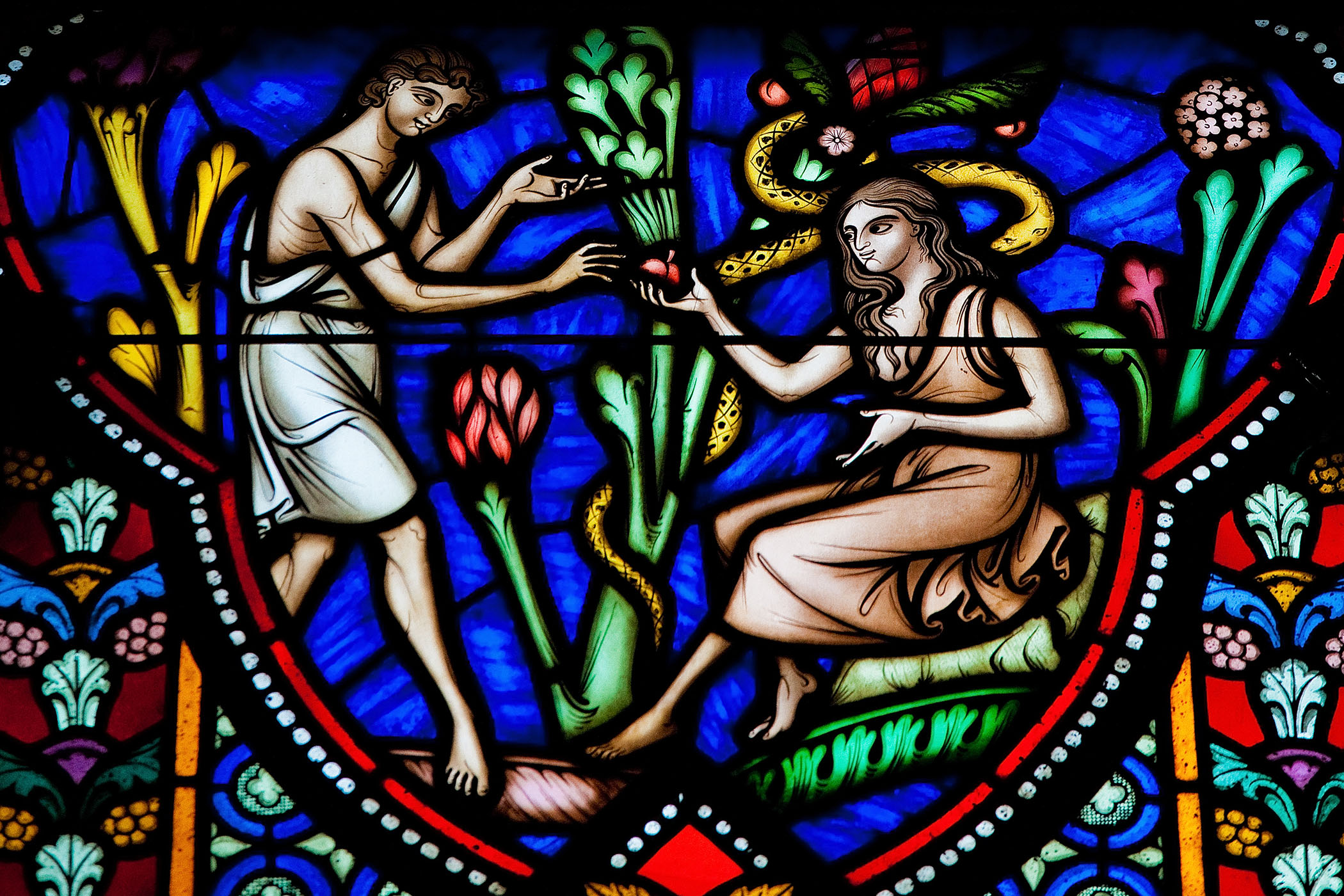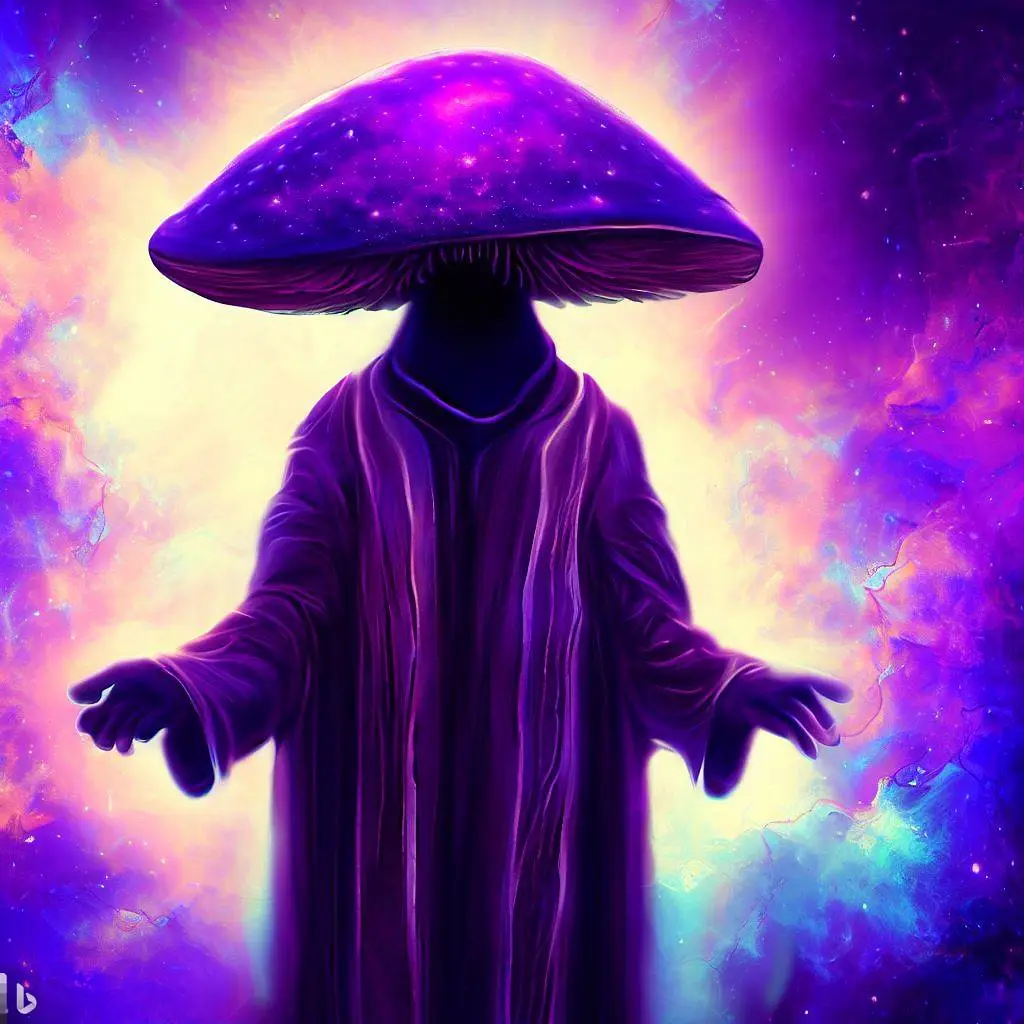It’s also not the Tree of Knowledge, it’s the Tree of Knowledge of Good and Evil. And that presents a problem:
If Adam and Eve did not yet understand what is and is not a good thing to do, they could not possibly have understood that it was not good to disobey God. Eve did not know the serpent was evil. And yet he punishes Adam and Eve for doing what they did not realize was wrong of them to do.
Go a step before that. Why’d God put the tree there in the first place?
God created sin, introduced it to humanity, and ensured evil would spread across the earth.
True. He even admits it in Isaiah:
Isaiah 45:7 - I form the light, and create darkness: I make peace, and create evil: I the Lord do all these things.
Can’t have light without dark. Can’t have good without evil. Otherwise you just have boring stagnation. God likes chaos and excitement, not boring safety.
Why can’t you have light without dark? If you sped up all the molecules in the universe to the point that they were all radiating heat, you would have light without dark.
You win this round, science.
Plus, admitting that God cannot create light without dark or good without evil means admitting God is not omnipotent.
Only if that heat radiation would be evenly distributed - otherwise you would have a gradient which still results in duality of light/dark
There are also places that are relatively empty, which would result in a more typical darkness
Also, speeding everything in existence up to the point of luminance is kind of tricky, what with natural law and all
Pretty sure almost all the matter we can interact with does produce blackbody radiation
Christians: God is Lawful Good.
God: Actually more like Chaotic Neutral.*Chaotic evil
God likes Nascar? For the crashes.
Calamity or disaster is a better translation. Looking at God as a judge, it’s His right to render a verdict and enact punishment.
Pretty good article on this verse and what it’s actually saying. https://www.str.org/w/does-isaiah-45-7-teach-that-god-created-evil-
A judge might have a “right” to punish people for things they didn’t know were wrong, but this is a judge who created those people without giving them the capacity to know right from wrong in the first place and then punishing them for doing the wrong thing anyway.
And of course a Christian apologetics website is going to give the kindest possible interpretation to that passage.
I’d also note that it’s part of the Jewish half of the Bible, so maybe finding out what Christians think about what it means is the wrong way to go about convincing people of your point. Maybe consult a Rabbi’s interpretation instead.
It always complete the picture to understand that the creation myth used in the Bible was not Jewish or Christian in origin. It was an appropriation of a pagan myth of the era. Like most Christianity, it is just a syncretism to make the cult palatable to the newly recruited. “Oh yes, that thing that you already believe in was totally our god”.
I think all major religious myths, like languages themselves, are derivative of previous myths on some level. Sure, there was a proto-mythology at some point, but it expanded, changed, etc. until it divided into multiple religions. And, of course, Judaism beget Christianity beget Islam, but all of them took other religious myths that were popular at the time and wove them into the tapestry.
I think they mean more like in say Europe where Christianity came in, took cultural events etc for other religions and claimed it as their own rather to make conversion easier.
This is colonial thinking. “Civilization just happens to be the natural evolution of what I am doing. Your ways are barbarian backwards savagery”. It is the same logic.
There’s nothing natural or linear in religious belief. Catholicism itself is fragmented into hundreds of sects, and so is every single religion ever to have existed. Adapted to the particular capricious vanities of the local clergy and the established local customs. Christians taking some Jewish elements was just a manipulation tactic. I’m also sure some Islam sects would behead you for suggesting that Islam is a derivative of Christianity. The theory of a proto religion is also wrong, we know for a fact that not all of modern religions started from the same proto-belief, but ancient religions are actually quite varied and distinct.
I didn’t make a claim even remotely like that. I was not talking about superiority in any way. I’m not a Muslim and what you’re saying I’m claiming would only make sense if I was a Muslim since that was the end of the “evolution” I was talking about.
Would you make the same claim about proto-languages, that modern languages are not derived from them?
Yes, any proto-whatever theory is colonialist in essence. It’s a very heated argument in anthropology, sociology and social psychology. The current consensus is that it is only valid for the indo-european migration, and a version exist for the proto-sino-tibetan migration. But, we understand that it can only be claimed to apply thus far, and with all sorts of modern ideological biases and caveats. Both language and religion are extremely complex social phenomena that have independently appeared all throughout history. And every time they have their very unique and distinct qualities. There’s no unified tree of languages that has enough evidence to be authoritative. And there’s no such linear derivation equivalent for religion. It is all just pop-sci feefees.
Wait… you’re saying that languages aren’t actually derived from older languages and anyone who thinks so is colonialist?
Because I would look into where the ‘ist’ suffix in ‘colonialist’ comes from. Believe it or not, it didn’t pop into existence along with the rest of the English language.
I’m sorry you don’t like it that Judaism was derived in great part by Babylonian mythos which, themselves, likely were derived from a previous mythos, but I’m not sure what that has to do with colonialism or any idea of superiority and I’m sorry you don’t like the simple fact that we can point to specific stories which eventually made their way into Judaism and then on to Christianity and Islam.
https://en.wikipedia.org/wiki/Gilgamesh_flood_myth
As for why that is linear? Because that’s how time works. The Babylonians came first, then the Jews, then the Christians, then the Muslims. And each one derived their religion from the previous one.
And yet he punishes Adam and Eve for doing what they did not realize was wrong of them to do.
You say this like punishing people who don’t understand the rules isn’t a fundamental part of christianity.
Adam and Eve was pre-Christianity though.
Side note, and God created the tree of the knowledge of Good and evil. God created everything. Therefore, God created evil.
Further, God does evil.
After the flood, there is a line that says “and God repented of the evil he had done”
And to me, that just basically means that evil is circumstantial. Not that there is a pure drop of evil in the universe, but rather that a thing that is meant to be a good thing can be an evil thing based on its interpretation.
To whit: it wasn’t evil that Adam and Eve were naked. God made them that way. And yet because they became aware of it and changed a innocent thing into an evil thing, that is what the evil was.
Which makes a lot more sense when you know these stories are adaptations of earlier myths. The polytheistic religions they came out of had no problem thinking the gods do evil things sometimes because they feel like it. As things transitioned to monotheism, and “God is good and merciful” was taken as a given, you end up having to jump through hoops to explain why this passage explicitly says God did evil. Even if the explanation is on some level convincing, it’s going to be more convoluted than “these stories evolved from earlier polytheistic religions”.
Consider that it is the knowledge itself that cast us down.
It doesn’t matter. They were being punished for something they didn’t know not to do.
Ignorance of the law is no excuse or whatever 🙄
You should check out the book Ishmael by Daniel Quinn. He points out the importance of the name of the tree and has really interesting anthropological theories regarding the origin of the Adam and Eve story.
Also God kinda lied to them or at least deceived them by saying they’ll die if they eat the fruit from memory.
He was saying they would grow old and die rather than living forever.
The Gnostic interpretation always made more sense to me. The serpent being a form of Christ.
“Eat the fucking fruit!”
Apple is probably the most common interpretation because a lot of languages use it as kind of a vague fruit term, and the Bible has been retranslated and reinterpreted roughly one million times. The French call potatoes apples
Including English: æppel meant any kind of fruit, which is why you have names like pineapple and elephant apple.
The french call potatoes earth apples. Pomme de terre.
It is also an older german term for them, though I believe austria still uses it: Erdapfel.
Same in Dutch: aardappel (aard=earth, appel=apple)
Not to be confused with the Pferdeapfel.
Except that basically all fruits were apples for a really long time.
https://en.wikipedia.org/wiki/Apple
Etymology
The word apple, whose Old English ancestor is æppel, is descended from the Proto-Germanic noun *aplaz, descended in turn from Proto-Indo-European *h₂ébōl.[3]
As late as the 17th century, the word also functioned as a generic term for all fruit, including nuts. This can be compared to the 14th-century Middle English expression appel of paradis, meaning a banana.[4]So yes… We have no idea what the fruit actually was. Because all fruit were basically called “apple”.
Good thing there never was any apple because it’s all fantasy improv. Just decide on a fruit and you are as right as everybody else.
You can still approach the story on its own terms. If we said Captain Sisko drank tea rather than Raktajino, it’d still be wrong, even though Sisko and Raktajino don’t actually exist.
There is a original writer on startrek. They could recon Sisco to a tea lover tomorrow. The Bible is more like meme history, there is no regulating mechanism other than popularity. If you made the apple a banana tomorrow and most people agreed, it would be a banana and you would be right.
That’s more of a cultural thing, and one that I have broader things to say in terms of how copyright law has altered our culture.
Fantasy stories come from pre-copyright sources. Greek gods, elves, mermaids, etc. were all folk tales that developed without anyone caring about ownership. If the term “canon” meant anything at all, it was because the community accepted a certain set of stories by consensus. Biblical canon was done that way. Even this tends to be a written culture thing; oral cultures have a much more fluid understanding, and care less about consistency.
When copyright comes along, you start having big corporations controlling canon. We tend to only accept Star Trek things from Paramount as canon, and even that has limits; Star Trek comics and novels aren’t usually canon, even though Paramount licenses them.
Lord of the Rings will be copyright-free in about 20 years. It itself borrowed a lot from those pre-copyright folk tales. I’d be interested to see if the community starts to come to a new consensus on stories from new authors becoming LotR canon.
if you believe they will let it go. Tons of stuff hasnt made its way to the public domain, its all corrupt.
Not sure what you mean. If you mean they’re going to change the law again to extend copyright, note that Disney didn’t even try for Steamboat Willy. I made that argument 5 years prior to it going public domain that Disney wouldn’t bother, and it was already too late to push it through. People still told me there would be some big secret push to get it through Congress. They kept making that argument until literally the week before, when Congress was already out of session for the holidays. It didn’t happen, and Steamboat Willy hit public domain.
They don’t seem to have the stomach to continue indefinite extensions. Current copyright terms are probably as far as they go.
I’m not arguing for or against, just saying that there is no path on deciding what the author meant because we don’t even know who wrote it and they are long dead anyway. And there is nothing to study in nature because it was all fiction.
What the author “meant” is vastly overrated. The author is dead is sometimes more literal than other times.
We can pull information out of the text on its own. We can get cultural context to see how they would approach it. In OP’s case of the apple, we know that the term “apple” was a generic term for fruit for much of English history (and still is in some other European languages). We also know that what we call apple trees now don’t grow in that region, and therefore, it’s almost certainly not that kind of apple.
Good thing there never was any apple because it’s all fantasy improv.
The validity of the story was never in question for me… I’m atheist. Doesn’t mean we can’t discuss the story for what it is. It’s clear the writers of the story called it an apple because that’s what all fruit would have been called. That’s it. Don’t need to shit on someone else’s belief in the process.
Just like the majority of colors were more or less unnamed in a LOT of cultures until relatively recently.
Edit: Typo
Of course, and I did not shit on any beliefs. I only commented on the phrasing that you chose, namely “what the fruit was”. Even if you were talking about a short story fan fiction this would be the same situation.
The story had dozens of authors and rewrites. There is no correct answer. Possibly some authors and editors would give you different answers. My take is that there is no correct answer to be found and we can’t rely on checking facts of the event.
It was probably butt. Buttfruit. Eating ass was the forbidden fruit.
So the fruit was a dingleberry?
I think apple used to be a generic term for fruits.
It is especially apparent for exotic fruits, for example here is a list of fruits from the Caribbean, none of then are related to the European apple:
- golden apple
- wax apple/rose apple
- pineapple
- sugar apple
- custard apple
It can, but I’m not sure if that explains why it’s often represented as an apple in the west.
Here’s what Wikipedia has to say:
In Western Europe, the fruit was often depicted as an apple. This was possibly because of a misunderstanding of – or a pun on – two unrelated words mālum, a native Latin noun which means ‘evil’ (from the adjective malus), and mâlum, another Latin noun, borrowed from Greek μῆλον, which means ‘apple’. In the Vulgate, Genesis 2:17 describes the tree as “de ligno autem scientiae boni et mali”: “but of the tree [literally ‘wood’] of knowledge of good and evil” (mali here is the genitive of malum). There is nothing in the Bible indicating that the forbidden fruit of the tree of knowledge was an apple.[10]
My German professor even mentioned the archaic apfelsine for the citrus orange.
Apfelsine is not archaic. Very widely used today, at least here in the south.
Also, it literally means “Chinese apple” lol
Apelsin in Sweden
It actually being a durian would have been too on the nose.
It’s been depicted as various things in old art and literature. Apple is very common. But you also find figs, grapes, pomegranates, and occasionally pears. Probably some others I missed.
I like the “magic mushroom” theory.
I won’t say I believe it. But I like it.
It’s common knowledge Mary Magdalene was a prostitute. I’m not sure why because it doesn’t say that anywhere in the Bible.
Well, I do. It was the easiest way to suppress women’s power in the church and in general.
I think there was a non-canonical gospel that said so. And yes, the early church seemed to be relatively liberal with women’s rights. A lot of that got clawed back with later additions and choices of what books to include in the biblical canon.
The gospel of Mary Magdalene for instance.
My money’s on it being a pomegranate originally. Apples wouldn’t have existed in the fertile crescent over 2000 years ago. Pomegranates are also messy and look bloody when eating them, fitting the “carnal knowledge” side of the story. I’ve heard other people suggest they could have been dates, but pomegranates seem like a way better fit for the story.
nice try, Tim Cook.
Only a few know the truth, it was a tomato. I know because the way that it is.
That’s why people throw tomatoes when they want someone to get off the stage.
🍆 🍑
Isn’t it a birds and the bees story translated through a religious conservative lense… The forbidden fruit is sex.
It’s knowledge of good and evil and it says that quite literally in Genesis, but fundies say all kinds of dumb stuff.






















